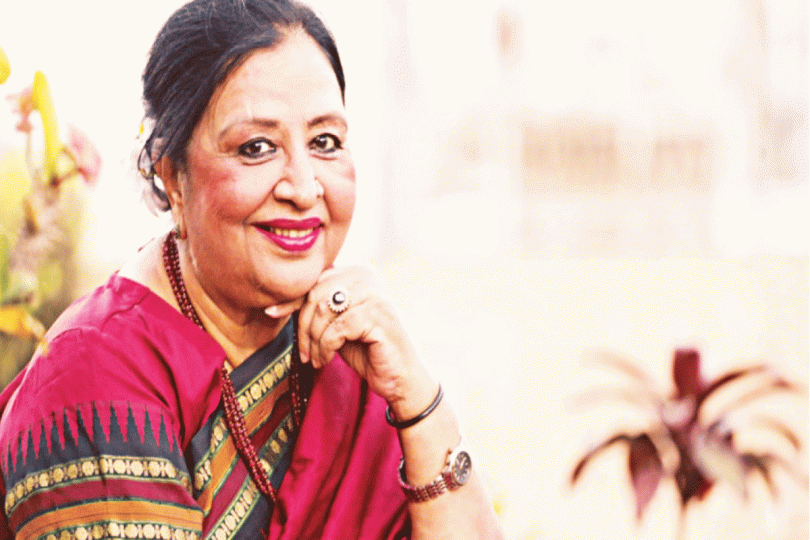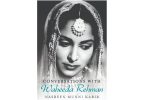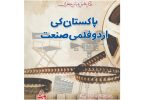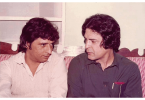BOLD remembers Pakistan’s biggest female superstar who celebrates her 80th birthday on 17th August
Think about the biggest film stars Pakistan has produced in the last seven decades, and the names of Mohammad Ali, Waheed Murad and Nadeem will come off the top of one’s head. However, think of female superstars and the first name that pops up in most minds is that of Shabnam, for she ruled the hearts of her fans from 1960s till 1990s, and kept evolving as an actress during those years.
Born on 17th August 1942 in Dhaka as Jharna Basak, the actress didn’t attain stardom at once. In fact she had to work hard and overcome demons to become the poster girl of Pakistani cinema. She came from East Pakistan which later became Bangladesh, wasn’t proficient in Urdu language and got married earlier in her career but she didn’t let anything stop her from becoming the first-choice of filmmakers during her career.
Although she last starred in a film more than 25 years back, she remains in the hearts of all those who are familiar with her work. Let’s take a trip down memory lane to find out what turned Jharna into Shabnam, and kept her so relevant that she went onto play romantic leads for more than three decades.
Phase One – The Initial Years
Back in the 1950s, when East and West Pakistan were one, Lahore and Karachi were known for their Urdu films while Dhaka made films in Bangla language. In an attempt to penetrate the East Pakistan market, filmmakers from the East wing came up with Chanda in 1962, which was amongst the first Urdu films to be produced in Dhaka. Featuring Rehman and Sultana Zaman in the lead roles, the film is remembered today for the performance of a certain girl Jharna (renamed Shabnam for films) who went onto win the Nigar Award for the Best Supporting Actress in her debut film.
Little did anyone know that Shabnam would go onto win as many as 13 Nigar Awards during her career, and inspire generations with her performance, both as an actress who can dance and a professional who never let success get to her head. After the success of films like Talash (again with Rehman) and Paisay, Shabnam was cast in poet and director Suroor Barabankvi’s Aakhri Station and played a mentally retarded girl who wandered around the railway station. Although she had one prominent dialogue in the film – Baboo Beeri – she managed to outshine everyone with her top-notch acting, including fellow actress Rani who agreed to do the film, knowing it had nothing much to do in it.


Shabnam’s popularity in the erstwhile East Pakistan was one of the reasons why actor/producer Waheed Murad cast her in his home production Samandar which tried to ease the tensions between the two wings. However, after the film couldn’t do well at the box office, a couple of directors used artiste Kaukab Afzal’s voice as Shabnam’s, but the practice was discontinued as soon as her Urdu became better. That’s when she began to deliver her own dialogues in her traditional over-the-top but relevant style, and carved a separate identity for herself.
Despite getting married to renowned music composer Robin Ghosh, Shabnam stayed busy in films and was part of prominent films like Jahan Tum Wahan Hum, Andaleeb, Ladla, all three with Waheed Murad, who was on the lookout for stable leading lady after Zeba’s marriage to Mohammad Ali. She didn’t stop working with other actors and was instrumental in the success of films such as Darshan with Rehman, Shareek-e-Hayat with Kamal and A J Kardar’s Qasam Us Waqt Ki opposite Tariq Aziz. However, it was during the late 1960s that she was paired for the first time with Nadeem in Tum Mere Ho and the two went onto act together till retirement did them apart in the late 1990s!
Phase Two – The Best Years
During the 1970s, Shabnam was so busy that producers had to request the government against issuing her an NOC to travel to the newly-created Bangladesh (formerly East Pakistan), because had she decided to stay back with her parents, they would have lost a lot of money since she was every filmmaker’s first-choice heroine. The way she donned a sari, spoke Urdu with a touch of Bangla language and choreographed her own songs to avoid looking vulgar made her the poster girl of Pakistani cinema.
Since Lahore had become the main centre of film industry after the creation of Bangladesh and the demise of the Karachi industry, Shabnam and Robin Ghosh shifted to Lahore, but not before she became the first Pakistan actress to be part of a song in front of the Eiffel Tower (Yeh Raahein Ajnabi Hain), or the Botanical Gardens (Waada Karo Milo Gay, both from Mere Humsafar) in Paris. Due to her reluctance to work in films featuring more than one heroine, she missed out on many films but later appeared in Talash and Saheli as the leading lady with other actresses being relegated to supporting roles.

What made 1970s the most memorable time of Shabnam’s career was the fact that she was the only actress at that time who could work with any actor (Zeba Begum worked only with her husband after marriage), was proficient in dance due to her initial training in East Pakistan and was comfortable in any role, be it that of a village belle (Mann Ki Jeet, Dosti, Jageer), a modern woman (Jalay Na Kyon Parwana, Dillagi, Aaina) and fit perfectly in characters of a blind girl in Bandagi, nightclub dancer in Zanjeer and a tomboyish girl in Mom Ki Guriya.
The 1970s was the time when Pakistan’s film industry was rediscovering itself and Shabnam’s presence was exactly what the doctor ordered. It was the time when Deeba and Nisho had taken a sabbatical after their marriages, and yesteryear actresses like Sabiha Khanum, Nayyar Sultana and Shamim Ara were past their prime. In such a scenario, only Rani and Shabnam were the most experienced leading film actresses and they carried the torch until others like Babra Sharif and Mumtaz were able to stand on their own feet.
Shabnam was part of Nazrul Islam’s Aaina as the leading lady, which went on to become the most successful Pakistani film after its release in 1977; although it had an excellent soundtrack composed by Robi Ghosh, it borrowed elements from the Indian flicks like Bobby, Aandhi and Kora Kaghaz. However, it was so well-made that Indian filmmakers repeatedly copied the movie – once as Pyar Jhukta Nahi in the 1980s, and once as Raja Hindustani in the 1990s.
Phase Three – The Wonder Years
Despite the arrival of a younger Babra Sharif in the 1970s who shared the screen with Shabnam’s frequent collaborator Nadeem in many films, Shabnam remained on top of her career in the 1980s. In fact, in 1989 before going on a sabbatical for a few years, her last film as a heroine – Lady Commando – was released, where her name appeared in the credits before that of her co-stars Babra Sharif and Ghulam Mohiuddin. That is enough to show that even in her late forties, she was fit and acceptable to the audience as a leading lady, which is something unthinkable today.
It was during this phase that Shabnam rediscovered herself as an actress and began the decade with Nahin Abhi Nahin where she was paired opposite a teenaged Faisal Rehman, but the pairing was perfect since she played an older woman. She also played leading lady to Waheed Murad in the last five years of his life and while some of their films did well and some didn’t, she was there with the producer who brought her over to Pakistan till his last breath.
She continued to play romantic leads with Nadeem but also delivered hits with younger leading men like Ghulam Mohiuddin and Javed Sheikh who attribute their success to her. Both the actors have repeatedly said that had it not been for Shabnam and Robin Ghosh’s support, they wouldn’t have been accepted as leading men, because other actresses didn’t want to work with newbies like them.


If Aaina was her biggest film in the 1970s, then Bandish from the same team kept her on top in the 1980s. She played the role of an air hostess who loses her husband to amnesia and is devastated when she finds out that he has remarried in a foreign land. She was also part of Nadeem’s Hum Dono that reunited them with their Jalay Na Kyon Parwana co-star Syed Kamal after a decade), Qurbani (that was copied in India as Adhikaar featuring Tina Munim in Shabnam’s character) and Aahat where she played the love interest of Nadeem but was married to Waheed Murad’s character.
Her films with Nadeem – Dehleez and Faisla – were remade in India as Oonchey Log (featuring Rajesh Khanna and Salma Agha) and Paap Ki Duniya (starring Sunny Deol, Chunky Pandey, and Neelam) respectively, while Kabhi Alwida Na Kehna resembled Bollywood flick Masoom since they were based on the same novel. She played a mature character again in Naraz that also featured Nadeem and Faisal Rehman, while Kamyabi, and Love in Nepal were also successful at the box office.
During this decade, she became so popular that despite being a leading lady, she called the shots instead of the producers. It was during that time that she rejected a Bollywood film featuring Amitabh Bachchan, Rekha and Shashi Kapoor, because she didn’t want to be cast as the second lead.
Phase Four – Return from the Sabbatical
Shabnam took a break from films in the late 1980s and returned to Bangladesh to be with her ailing parents, however she did return occasionally to Pakistan to complete some of her films, Awargi being the most prominent one where she played a young to old character courtesy director Javed Fazil who used one of the songs from his earlier film Aahat to give her character a backstory. Her last film, however, was Aulad Ki Qasam that was released in 1997, and reunited her with Javed Fazil and Nadeem, the trio that was instrumental in the success of Aahat, Lazawal, Faisla, and Naraz as well. It was also Shabnam’s 50th film with Nadeem with whom she first worked in Tum Mere Ho in 1968.
After leaving Pakistan for good, Shabnam did one film in Bangladesh titled Ammajan where she played the titular character. The film went onto become one of the most successful films ever produced in the country and the credit goes to Shabnam who used all her experience to deliver a hit before her 60th birthday. Her innings as an actress didn’t end with 150-odd Urdu films, because she returned to Pakistan two decades later as an actress and worked in Ali Tahir’s Mohini Mansion Ki Cinderellayain, that was aired on BOL Entertainment in 2018. In that Faseeh Bari play, Shabnam played a character that was a huge Shabnam fan and even believed that she resembled the yesteryear actress.
For nearly 40 years, Shabnam kept entertaining the audience in Pakistan and would prominently feature in any book that covered the history of films in the country. Most of the memorable songs from the 1960s till the 1980s were filmed on her, and singers from Noor Jehan, Mala, Runa Laila, Mehnaz, and Naheed Akhtar lent their voice for the highly-respected actress. From Captain Ihtesham to Pervez Malik, Nazrul Islam to S Suleman and Suroor Barabankvi to Javed Fazil, she worked effortlessly with the best directors and was one of the many reasons that kept Pakistan’s film industry afloat till the 1980s.
17 memorable Shabnam songs
- Yeh Samaa Pyara Pyara – Mala – Darshan
- Mere Dil Ki Mehfil – Noor Jehan & Ahmed Rushdi – Andaleeb
- Kuch Log Rooth Kar Bhi – Noor Jehan – Andaleeb
- Saawan Aaye – Runa Laila & Ikhlaq Ahmed- Chaahat
- Chitti Zara Sayaan Ji Ke Naam Likh De – Noor Jehan – Dosti
- Humain Kho Kar – Runa Laila – Ehsaas
- Mera Babu Chail Chabeela – Runa Laila – Mann Ki Jeet
- Dinva Dinva Main Ginoon – Runa Laila – Mann Ki Jeet
- Bol Ri Gurya – Nayyara Noor – Aas
- Tera Saaya – Nayyara Noor – Gharana
- Waada Karo Saajna – Mehnaz & Alamgir – Aaina
- Mujhe Dil Se Na Bhulana – Mehnaz & Alamgir – Aaina
- Roothe Ho Tum Tum Ko Kaise – Nayyara Noor – Aaina
- Humari Sanson Main Aaj Tak Woh – Noor Jehan – Mere Huzoor
- Do Pyaase Dil – Mehnaz & Mehdi Hasan – Bandish
- Mera Tujh Se Aisa Bandhan – Naheed Akhtar – Qurbani
- Waada Hai – Mehnaz & A Nayyar – Aahat







